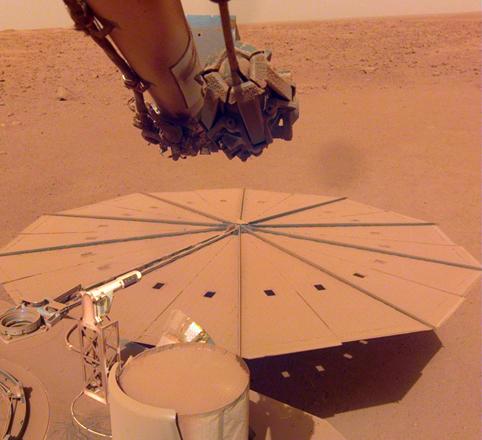You are here
Jordanians send their names to Mars with NASA spacecraft
By Ahmed Bani Mustafa - Oct 10,2017 - Last updated at Oct 10,2017
AMMAN — Hundreds of Jordanians have subscribed to a NASA programme that offers people the opportunity to have their names get sent to Mars in November 2018.
Jordan ranked fifth in the number of applicants among Arab countries, with 1,892 registrations, following Egypt, Morocco, Saudi Arabia and Syria, while the US topped the participation numbers with more than 300,000 subscribers.
When NASA’s InSight lander (Interior Exploration using Seismic Investigations, Geodesy and Heat Transport) reaches Mars in November 2018, it will carry with it hundreds of thousands of names from members of the public, according to NASA.
In 2015, nearly 827,000 people signed up to add their names to a silicon microchip onboard the robotic spacecraft. NASA is now adding another microchip, giving the public a second chance to send their names to Mars.
“Mars continues to excite space enthusiasts of all ages,” Bruce Banerdt, the InSight mission’s principal investigator at NASA’s Jet Propulsion Laboratory in Pasadena, California, was quoted on their website as saying. “This opportunity lets them become a part of the spacecraft that will study the inside of the Red Planet.”
New name submissions will be accepted through November 1, 2017, NASA confirmed.
Participants in the fly-your-name opportunity receive “frequent flier” points that reflect their participation in NASA’s exploration of Mars. Individuals who submitted their names during the earlier Insight opportunity in 2015 can download a “boarding pass” and see their “frequent flier” miles.
In 2014, a chip carrying the names of 1.38 million people flew aboard Exploration Flight Test-1, the first flight of NASA’s Orion spacecraft. The next opportunity after InSight to earn frequent flier points will be NASA’s Exploration Mission-1, the first flight that will bring the Orion spacecraft together with the Space Launch System rocket to travel thousands of miles beyond the Moon.
NASA’s InSight (lander will be the first mission to explore the deep interior of Mars, according to NASA.
InSight will place a seismometer to detect marsquakes and meteor strikes, using the seismic energy of these phenomena to study material far below the Martian surface. The lander will also deploy a self-hammering heat probe that will burrow deeper into the ground than any previous device on Mars.
InSight is scheduled to launch atop an Atlas V 401 booster from Vandenberg Air Force Base, California, in May of 2018, a statement by NASA said.
Related Articles
PARIS — From Yuri Gagarin to the first man on the Moon and the robot that landed on a comet, we look at 10 key dates in space exploration.&n
A comet the size of a small mountain and about as solid as a pile of talcum powder whizzed past Mars on Sunday, dazzling space enthusiasts with the once-in-a-million-years encounter.
WASHINGTON — After some four years probing Mars’ interior, NASA’s InSight lander will likely retire this summer as accumulated dust on its s


















